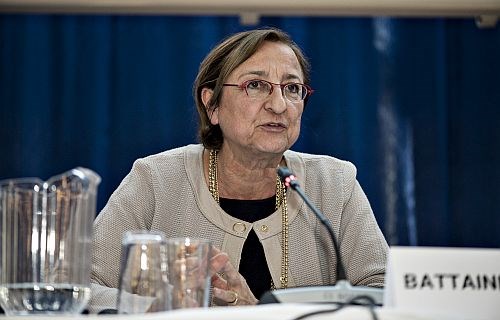Human rights in sport rises to the top of the agenda in the Council of Europe

Gabriella Battaini-Dragoni, Deputy Secretary General of the Council of Europe, calls on governments, sports organisations and businesses to ensure that a human rights culture permeates the sports world. Photo: Thomas Søndergaard
17.02.2021
By Kirsten SparreThe issue of human rights in sport has risen to the top of the political agenda among the 47 member states of the Council of Europe. Over the past three months, the European sports ministers have held their biennial conference in several online stages, and on 11 February they decided on the principles that should govern the upcoming revision of the European Sports Charter (ESC) including a specific resolution about human rights in sport.
The European Sports Charter lays down the basic principles for national sports policies and aims to inspire policy makers and member states on how to perfect their existing sport legislations and to develop a comprehensive framework for sport.
The charter is from 1992 and was last updated in 2001, so it was decided to revise it now to take the newest developments in the world of sport into account.
Respect for human rights in sport has emerged as one of the key issues that the ministers of sport want to see addressed. The topic was identified at the previous conference for sports ministers in 2018, and as Gabriella Battaini-Dragoni, Deputy Secretary General of the Council of Europe, said in her speech to the ministers’ conference:
”Back in 2018, I was struck by the clarity of thought about the challenges facing sports today: Globalisation, commercialisation, and the increased visibility of sport have both changed the nature of human rights and rule of law violations and drawn them further out, into the open. The sexual abuse of children, the exploitation of players and employees, and the lack of access to justice. These were among the key challenges identified as requiring action.”
40 of the European Council’s member states work together within the framework of the Enlarged Partial Agreement on Sport (EPAS), and in the coming period, EPAS will work with the sports movement to make protection of human rights a priority and to protect the economic and social rights of athletes.
The ministers’ resolution also calls on the Council of Europe member states to
- further enhance the protection of children’s rights in sport
- promote access to justice and the right to fair trial in the field of sport
- prevent, fight and respond to violence, discrimination, sexual harassment and abuse and hate speech
- strive towards gender equality
- defend media freedom in the field of sport
- defend athletes’ freedom of expression and association
- promote inclusiveness and diversity in sport
- use sport as a key contributor to improving physical fitness and mental well-being
”To ensure that a human rights culture permeates the sports world, we need governments, sports organisations, and business alike to buy into it. And this resolution is a bold and necessary step in that direction,” said Battaini-Dragoni.
The revision of the European Sports Charter is expected to be completed by September 2021.
More information





